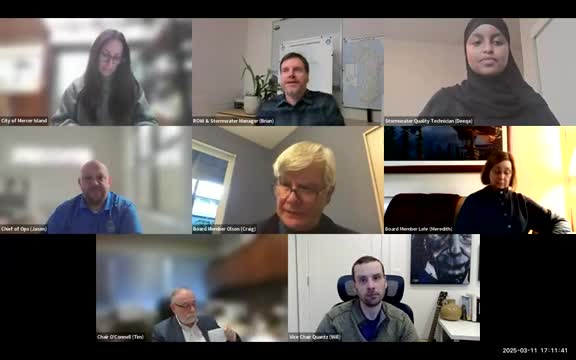Utility board hears stormwater operations update and new NPDES requirements
Get AI-powered insights, summaries, and transcripts
Subscribe
Summary
City stormwater staff told the Mercer Island Utility Board about routine maintenance, inventories and a new NPDES permit (2024–2029) that adds requirements for managing existing development, tree-canopy mapping, a behavior-change campaign focused on Watershed Basin 7, and a source-control inspection program.
Mercer Island Utility Board members heard a detailed report on stormwater operations and new National Pollutant Discharge Elimination System (NPDES) permit requirements during their meeting.
Brian Hertvigsen, the city’s stormwater and right-of-way manager, told the board the system “is a system that transports all the surface water through a series of conveyance systems eventually into Lake Washington because we are an island in the middle of Lake Washington.” He said the system includes 357 outfalls to the lake, 5,565 catch basins (17 more than at the last review), about 83 miles of piped conveyance, 13 miles of open ditches and 9 miles of open water courses.
Hertvigsen described the city’s maintenance program: routine pipe-camera inspections and jet cleaning, use of a contracted Vactor service to remove sediment from catch basin sumps and ponds, decanting and testing liquids sent to King County’s wastewater system, and a quick spill-response program that uses portable spill kits and the city street sweeper. He said the city recorded 20 illicit-discharge incidents in 2024 — about a 50% drop from the previous year — and emphasized that “illicit discharge” in the permit means any non-rainwater input to the system, not necessarily intentional dumping.
Deka Roble, the city’s stormwater quality technician, summarized the new NPDES 2024–2029 permit that took effect in August 2024 and added a ninth component: stormwater management for existing development. She said the city will implement elements of its Stormwater Management Action Plan (SMAP) focused on Watershed Basin 7, map public and private tree canopy island-wide to identify sites where added canopy could increase infiltration, and launch a behavior-change campaign targeted to the commercial area in the Southend (near the QFC/Starbucks) to reduce pollutant sources such as open dumpster lids.
Roble said the permit requires a source-control inspection program; the city must inspect at least 12 businesses. She described inspections of gas stations and an auto-detailing business in which staff required spill kits, catch-basin cleanings, removal of exposed chemical containers and staff training. Roble characterized inspections as primarily educational and said the city has a progressive enforcement program if businesses do not comply.
Board members pressed staff on private-property responsibility and repeat offenders. Staff said the city enforces only on city-owned system components; private systems that discharge into the city system must be kept clean by the property owner, and repeat problems are handled by code enforcement. Hertvigsen and Roble said the city will use new technologies — including a portable flow monitor installed in November to gather surcharge data — to help prioritize upgrades and capital projects.
Hertvigsen added operational details: the street sweeper is about 10 years old and staff are considering an electric replacement; year-to-date sweeping this quarter covered 51 miles of arterial roads, 16 miles of residential streets and 11 miles in the town center; decanted liquids from sediment removal are tested quarterly and routed to King County under a discharge agreement; and some unknown, smaller private laterals have been discovered and repaired when they affected the public right-of-way.
Roble noted near-term deadlines under the permit: the behavior-change campaign must be implemented by July 1 of this year, and the municipal street-sweeping program component has a 2027 milestone. Staff will report progress in the city’s annual NPDES report and continue to evaluate equipment and software to improve inspections and condition assessments.
Board Chair Tim O’Connell thanked staff for the presentation; members complimented field tours and staff work on limited budgets.
The board did not take formal action on policy changes during the presentation; staff said several items will feed the capital improvement program and will return for further discussion as projects are scoped and designed.
